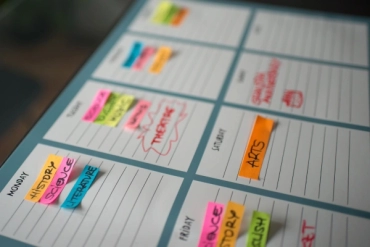Behaviour Management
Contrary to popular belief, Behaviour Management isn’t about punishment. In fact, it’s quite the opposite – Behaviour Management emphasises positive reinforcement to encourage desired behaviours.
Essentially, Behaviour Management refers to the strategies that design a positive, safe environment for a child’s holistic growth. Our expert staff ensures that this aids our students in developing self–regulation skills that will greatly empower their independence in the future.
How Does Behaviour Management Work?
Set Clear Expectations
Clearly communicate to your child what the desired behaviours and rewards are. Also, define the boundaries of unacceptable behaviours and the consequences of such behaviours.
The predictable routine instills in them a sense of security because they now know that their positive behaviour will be rewarded with positive action.

Open Communication
Maintain open communication with your child. This means that you should discuss the expectations with your little one and explain to them the reasons for you setting them.
If they feel that some boundaries are too harsh, hear them out and work out a compromise. Behaviour Management should have fair and reasonable rules in order to yield effective results. Otherwise, your child may simply rebel against the rules for the sake of it.

Routine And Structure
Establish clear routines and structures for your child. This provides your little one with a sense of security and stability, because they know what to expect from their good behaviour.
Be sure to enforce the routine and structure daily! Also, adhere to the expectations set earlier. Otherwise, your child might be confused as to why their behaviour is sometimes rewarded, and sometimes not, then choose to misbehave. This could make the entire strategy less effective.

Positive Reinforcement
Pay attention to your child’s actions and be sure to generously reward their desired behaviour management. Acknowledge and praise such actions to encourage their repetition.
The praise need not be only for intentionally ‘special’ good behaviour. You can acknowledge and reward their everyday actions (e.g. sharing toys, finishing their meals) as well. This boosts your child’s self-esteem and encourages them to keep up the desired behaviour management.

Emotional Regulation
Behaviour Management will help your child to process what they are feeling in a healthy manner, which is an extremely useful life skill.
For example, a child may scream at someone who is playing with their favourite toy. Behaviour Management lets them understand that while their feelings are valid, their way of expressing it may hurt someone else, and this is undesirable.
Instead, Behavioural Management teaches them to acknowledge their frustration and engage with it in a more desirable behaviour, perhaps by politely asking for a turn with the toy.

Why Is Behaviour Management Important?
Safe, Positive Learning Environment
Clear expectations and consistent routines lets your child feel safe and secure. This helps them to better focus on their learning and feel comfortable discovering more about their surroundings.
Reduced Disruptions
By proactively managing behaviour, educators can minimise disruptions. This ensures that class time is maximised for all students, so they can enjoy an enriching learning experience.
Improved Learning Outcomes
Behaviour Management helps your child feel safe and supported, which facilitates focus. This increases their eagerness to learn and leads to better academic results.
Social-Emotional Development
Our expert staff integrates social-emotional learning with behaviour management strategies. This develops skills such as empathy, self-control and problem solving in our students, which serve them far beyond the classroom.
Increased Self-Esteem
Positive reinforcement and guidance help children to become more confident in managing their own behaviour. This grants them a sense of agency that boosts their self-esteem.
Stronger Relationships
Behaviour Management facilitates positive relationships among your child’s peers and educators. This is because it promotes a sense of understanding and respect in your child.
